I don’t know how I missed this two-day-old Dreamgirls rave from New Yorker critic David Denby: “The sigh you will hear across the country in the next few weeks is the sound of a gratified audience: a great movie musical has been made at last. Dreamgirls is a singing, not a dancing, musical, [and] we can tell from the easy fluency of the movie that [its] basic urge is to merge and join things, not to separate them. Again and again, director Bill Condon lets a declaration of love, an argument, a music-business event flow directly into the next moment, and then into the next, in an exhilarating organic structure with liquid joints.”
Day: December 20, 2006
Manhattan pics #9
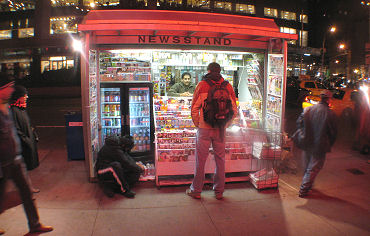
Newsstand on Broadway in the mid 60s — Tuesday, 12.19.06, 11:35 pm; Somewhere near Kearney and Mott last Sunday; the grease on the lens (middle-right area) came from a slice of really good pizza…took me days to wipe it off; IRT garbage train — Tuesday, 12.129.06, 11:45 pm.
Screener hubbub
Whoops…now the Director’s Guild of America has reportedly decided against permitting distribs to send screeners to individual DGA members, per a “breaking news” announcement on Movie City News. This sounds so priggish, so locoweed. Everyone all over town with any kind of industry connection has screeners sent to them (Oscarwatch’s Sasha Stone says that “the check-out guy at my local Von’s is getting screeners and Rob Reiner isn’t?”) so what’s the DGA’s problem, aside from being flaky and indecisive? I guess we’ll find out soon enough.
The noteworthy things in Poland’s earlier Hot Blog riff on the earlier reported DGA screener policy — i.e., saying it was okay to send them out — were (a) the dissing of L.A. Times reporter Robert Welkos for having buried the “earth-shaking” news about the changed policy about nine paragraphs down (i.e., on the jump page) in his 12.13.06 Envelope-posted story — last Wednesday! — about how industry rank-and-filers see Oscar contenders, and (b) getting in a dig at the Times‘ Oscar-savvy website by writing that “since The Envelope has not become a closely read publication in the industry, most didn’t even see [the story].”
Dean Bacquet’s heroic stance
“Oh, what a year for newspapers! They’re dying! They’re keeling. They’re ghosts! They’re dinosaurs! They’re mice! Eeeek! And that’s just from the publishers. This is the first business in the history of capitalism where the owners are trying to terrify themselves out of business. Newspapers. Ohhh…the kids don’t read ’em. Ohhh…the Internet. Ohhh…shit. So in a year of panic in the newspaper business, the crisis of the press came to this: The most inspiring media hero this year was the guy who quit.” — from a New York Observer “Media Mensch” profile of Dean Baquet, the former L.A. Times editor who resigned “under pressure” six weeks ago for refusing to make staff cuts.
What does Dallas-Ft. Worth know?
L.A. Times columnist John Horn is reporting that “the Dallas-Ft. Worth Film Critics Assn., a group of online, print and broadcast journalists that isn’t even on most people’s radar, seems to [pick Oscar winners] most often. Like the DGA, the group missed only Crash over the last five years, picking Brokeback Mountain instead. Every other time, its top film also went on to grab the Oscar.”
But of course, the Dallas-Ft. Worth team handed United 93 its Best Picture prize a few days ago, and we all know the name of that tune as far as Academy members who’ve refused to see it are concerned. Horn doesn’t mention this for some reason. His piece is mainly about how the Golden Globe winners aren’t reliable indicators.
Goldstein on negative campaigns
L.A. Times industry pulse-taker Patrick Goldstein has drawn on the familiar analogy between Oscar campaigns and Presidential election campaigns, and suggested with some humor what certain attack ads might sound like if Hollywood marketers were to imitate the tactics of big-league election strategists without reservation.
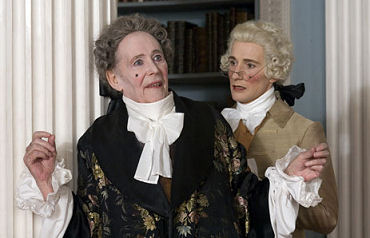
“The two worlds are eerily similar,” Goldstein observes. “When it comes to winning an Oscar or an election, shrinking violets need not apply. In fact, it’s gotten to the point that if you stay home instead of shamelessly showing up at every party in town, as Peter O’Toole has this year, the bloggers start speculating that something is amiss, as if you have to work the circuit to be taken seriously. God forbid anyone would allow a performance to speak for itself.”
That last sentence is a partial reference to a 12.2 piece I wrote about O’Toole’s no-show strategy, which may be less of a strategy than a fall-back situation dictated by health factors. O’Toole is a great actor and sublime in Venus, but he’s on the verge of losing the Oscar because of his absence — trust me. He’ll probably be nominated, but every insect antennae vibration is telling me he won’t win. I love the guy and I hope I’m wrong.
Maybe later-is-better will turn out to be a brilliant move (the plan earlier this month was for the ailing 74 year-old actor to turn up in Los Angeles in mid-January), but O’Toole, let’s face it, is not exactly Will Smith — i.e., not a chummy-shmoozer type and therefore not a widely beloved figure — and the fact is that he could probably do with a little flesh-pressing and image-buffering. On top of the fact that reactions to Venus have been admiring and respectful, yes, but not 100% ecstatic.
This last statement is the crux of the matter. Venus is a smallish, low-budgety watercolor movie, and I keep hearing that it isn’t knocking people dead. Plus an Oscar blogger I spoke to earlier today assured me that women aren’t likely to vote for O’Toole because the notion of a randy septugenarian with a thing for a young lassie will strike them as somewhat distasteful, or certainly not very appealing.
I like this Goldstein line, however: “If the National Board of Review of Motion Pictures award winners are the equivalent of the Iowa caucuses, then the New York and Los Angeles Film Critics awards represent the New Hampshire primary.”
One more comment about Goldstein’s remark that “God forbid anyone would allow a performance to speak for itself.” Of course, Roman Polanski never left Paris during the ’02-’03 Oscar season and his direction of The Pianist did speak for itself, despite a whisper campaign that tried to discount him over his mid ’70s legal troubles. And glory hallelujah — the haters and the whisperers lost.
Great Oscar Debates
As long as we’re comparing big-time Presidential politics to Oscar campaigning, allow me to resurrect an idea I floated last year that everyone ignored: holding Great Oscar Debates.
“Nobody disagrees with the notion that Oscar campaigning has become a lot like running for the White House,” I began, “so why not accept this and stage a special annual series of Academy-sponsored debates at the Academy theatres in Beverly Hills and New York?
“Not so much in the manner of the big-candidate debates that (usually) happen in a Presidential election year, but those sometimes stirring speeches that are given at the Republican and Democratic nominating conventions by party leaders, political allies and friends. Well-known filmmakers, industry figures, esteemed film critics and Academy members could get up in front of a mike and explain why they believe this film or that nominee is especially deserving.
“The speakers would offer impressions, career histories, political considerations… whatever. The same views that are routinely shared after screenings and at parties, only with more people listening and with a bit more sobriety all around.
The idea would be to cut through the mental-cobweb impressions, through the party chit-chat and the DVDs and the trade ads and the hate rants. It seems to me that specific, impassioned, thought-out reasons to vote for this person or that film would sharpen the focus.
“Presidential debates are about candidates trying to tell it straight and cut through impressions created by TV ads and prejudices thrown at the voters. Why shouldn’t the same goal at least be attempted in the Oscar realm? The town obsesses over this darn thing for three or four months out of the year and millions are spent on campaigns, so why the hell not?
“The Academy could stage the debates over a two- or three-day weekend at the Academy theatre right after the nominations are announced. It could be a weekend-long festival atmosphere type of thing — food, mingling, film clips, and discussion groups along with the various speakers.
“Every nominated person or film would be examined and toasted in some detail, and nominees would be forbidden from attending — only friends, colleagues and publicists could do the pitching. And no negative stuff.
“Oscar arguments happen left and right online, of course, but there’s something about live dialogue that cuts through the crap. Every time I get into a friendly dust-up with friends about this or that Oscar contender, I come away with a clearer head.
“The whispering campaigns (like the one mounted against Paradise Now, or the one that went around a few years back about John Nash, the protagonist-hero of A Beautiful Mind) would almost certainly make less of an impression if the “issues” could be fully aired in a live setting.
“People don’t fill out their Academy ballots after thinking things through to the bottom like a Yale mathematician — Oscar favorites are usually emotional gut calls. But perspective and examination can’t hurt the process, and a weekend of Great Oscar Debates would shed light on the short films and the sound-editing nominees and other low-profile contenders.”
Making predictions
The longer Oscar season goes on, the harder it is to make supposedly on-target Oscar Balloon calls and — this year — offer similarly shrewd predictions for The Envelope‘s Buzzmeter. You get sick of it after a while, for one thing. And you can’t abstain 100% from putting in films and performances that you know are superior grade, even if you know deep down they probably don’t have a chance of being nominated. And you can’t discount the notion that we’re on a moving train. You can smell the coffee like anyone else and predict Forrest Whitaker and Helen Mirren to win for Best Actor and Best Actress, etc., but if you don’t draw from the heart and follow your instincts, it starts to feel foul. The more uniform the predictions, the draggier this game gets.
Stallone and Jesus
Sylvester Stallone, whose Rocky Balboa opens today, has apparently accepted Jesus Christ as his personal savior, and he’s making that known. I don’t know how to react to this, but it feels a little weird. I know Stallone slightly — I worked for him in the Rambo II days as an employee of publicists Bobby Zarem and Dick Delson, who had him as their #1 client at the time, and then I interviewed him on the set of Cliffhanger for a N.Y. Times piece in ’92 — and I can’t think of a less-likely convert. But whatever works.
Defamer‘s Mark Lisanti says it pretty well: “We suppose that it would be a little cynical of us to suggest that an opportunistic Stallone showed up to chat with Pat Robertson about how he’s put his career in God’s hands just to drum up some business from the Passion of the Christ crowd. At least (as far as we know) the actor didn’t go so far as to claim that he wrote the original script in the margins of a Bible while sitting in the confessional at his church, or relate an anecdote about how he finally won the fight with writing partner Jesus that resulted in Rocky being a scrappy, underdog boxer instead of a humble carpenter.”
Arkin at Lincoln Center
Little Miss Sunshine costar Alan Arkin was feted last night (12.19) by the Film Society of Lincoln Center and Fox Searchlight, and it’s probably safe to say that everyone there realized (or was reminded of) the same two things. One, Arkin’s comic personality is undiminished — he’s still harboring the confessional, neurotic, New York Jewish worry-wart aspects — and two, keeping in touch with this side of himself has made his acting vital and alive and, when he feels like turning on the spigots, funny as hell.
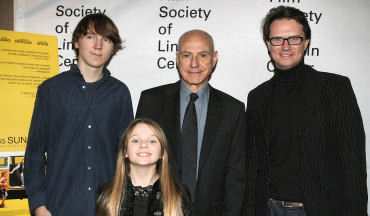
At Tuesday night’s Alan Arkin tribute at Lincoln Center’s Walter Reade theatre (l. to r.): Little Miss Sunshine costars Paul Dano, Abigail Breslin, Arkin; Fox Searchlight president Peter Rice
I was there and recorded his on-stage chat with associate director of programming Kent Jones. I didn’t think to start recording until about 10 minutes in, but there’s plenty of good stuff here. (Jones’ question at the very beginning sounds a little faint, so here it is: “What was it like to make the transition from theatre to film?”)
The event, of course, was about reminding everyone that Arkin is both touching and a riot as Sunshine‘s ornery, heroin-snorting grandfather. His performance feels like a near-lock for a Best Supporting Actor nomination, or so it seems to me. I was just as enamored of Steve Carell and Paul Dano‘s work in Sunshine, but Arkin delivers the heart and the biggest laughs. Plus he’s long overdue — he was nominated for Best Actor in The Russians Are Coming, The Russians Are Coming (’66) and The Heart Is a Lonely Hunter (’68) but lost both times.
Asked to define the difference between comedy and tragedy, he quoted an old Mel Brooks line: “A tragedy is I’m walking down a street and I fall into a manhole. A comedy is you’re walking down a street and you fall into a manhole.”
He talked about Catch 22, in which he starred as Joseph Heller‘s reluctant bom- bardier Yoassarian, in mostly disparaging terms. He hasn’t seen it in years but remembers it as a muddled effort that he didn’t much care for. Photography, lighting and production design concerns took forever to set up, he said (it took almost an entire week for a shot of him walking up an outdoor staircase in Rome), he felt off-balance about how to play his part, and director Mike Nichols had an “imperious” air about him.
Arkin’s biggest regret, financially speaking, was getting cast by director Steven Soderbergh in Ocean’s 11, and then getting sick and regretfully backing out. The role was filled by Carl Reiner, who benefitted big-time because of the hefty salary times three.’
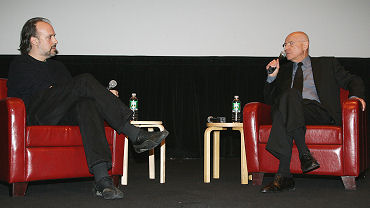
He said that his next film, which will roll film in Alberquerque in Feburary, is Sunshine Cleaning, a comedy about a dad who runs a crime-scene cleaning business and his two daughters, to be played by Emily Blunt (The Devil Wears Prada) and Amy Adams (Junebug). Christine Jeffs (Rain, Sylvia) will direct from a script by Megan Holley. Peter Saraf (Little Miss Sunshine) is producing. Arkin called it “a sweet little script — no blue screen, no franchise.”
Working with director Norman Jewison on The Russians Are Coming, The Russians Are Coming “was so wonderful [that it] ruined me for the next bunch of films,” Arkin said.
Asked by an audience member to name his three favorite characters, the 72 year- old actor said, “I can hardly name three characters I played any more. I can’t remember anything and I’m proud of it. I can’t hear anything and I can’t remember anything…and it’s fun! I used to be the most comfortable with foreigners and outsiders because I felt like an outsider myself. Now I feel most comfortable playing morons who spout philosophy. The character in Little Miss Sunshine, I could play him for the rest of my life — a foul-mouthed moron who has answers to everything.
“I used to suffer with my characters. I used to pace the room and live with them 24 hours a day. Now I just want to have a good time. Jean Renoir once said, I used to have great messages to send to the world. Now I just want to send the world my love. Anything else is just dumping on people.”
“Paying people to be your therapist doesn’t work because at the end of the day you’re standing in the same mode. This crazy profession is nuts…the emotional life of the character [you’re playing] has to affect you in some way. Andy Garcia once told me I can’t become a peaceful person…if I do, how can I play the darker colors? Yeats said the same thing — going into analysis would hurt his raw material too much.”
After the interview ended and Little Miss Sunshine began to screen, Fox Searchlight publicists herded everyone (Arkin and his family, Jones, Sunshine costar Abigail Breslin and her parents, Fox Searchlight president Peter Rice, Saraf, myself, director-writer James Toback) over to Shun Lee for a big delicious dinner that lasted a couple of hours. A great evening all around.
Stiller’s kids did it
MSNBC freelancer Patrick Enright hasn’t caught Ben Stiller‘s latest film, Night at the Museum (which screens today at 3 pm, which in itself is usually a bad sign — films shown to the press during daylight hours are usually simple-ass family fodder) but he’s come up with an interesting theory that explains Stiller’s lamentable decline.
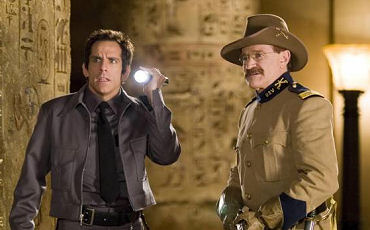
Three or four years ago, he recalls, Stiller’s comedies began to be less and less funny, with more than a few being flat-out difficult to sit through (Duplex, Envy, Dodgeball: A True Underdog Story, et. al.). And Enright’s theory is that Ben’s kids did it.
Don’t dismiss this to quickly as some cruel journalistic riff. Kids always make artist-parents more open to doing this or that job for the money, as cash fortifies the nest. I’m a parent and know whereof I speak — it’s a very natural, probably inescapable impulse. Why do you think Heath Ledger is playing the Joker in Chris Nolan‘s next Batman film?
“Some wags might be tempted to attribute your career implosion to bad management or drugs or Scientology,” Enright comments, “but the real culprit is much, much more sinister. Something else happened in 2002, the year your movies went south so drastically: Little Ella Olivia, your first child, was born. Coincidence? I think not. And you didn’t stop there; No. 2, Quinlan Dempsey, came along in ’05.
“Yes, I blame the children — it’s a well-substantiated, scientifically tested theory that having kids drains the talents of great comedians, leaving them hollow and laugh-deficient, capable of and interested in only fart jokes and the occasional animated movie.
“The once-hilarious Eddie Murphy went through exactly the same decline, starring in his first major bomb, Harlem Nights, the year his first kid appeared on the scene. Whether it’s caused by a hormonal shift that kills any sense of The Funny or springs from a desire to create movies that please the young spawn, the trend is career-fatal.”
I would go farther and say that for many artists, feeling happy and settled and soothed isn’t precisely “bad” for their creative output, but it doesn’t seem to exactly help either. This may sound deranged or masochistic to some (and I’m not saying it applies to each and every actor, comedian, writer and gallery artist) but some artists feel they need to be on the edge in order to keep themselves sharp and focused — to pick up on those shortwave transmissions that tell them what’s next and where to go.
Sidenote: Enright’s piece wrongly states that Stephen Sommers is the director of Night at the Museum (i.e., the passage in question calls the film “Steven Sommers’ attempt to bring his crazy Mummy antics to a setting that wouldn’t require travel to far-off locations.” Enright also obviously misspells Sommers’ first name, which is “Stephen.” It’s easy to fix this, guys…shake a leg.
“Night at the Museum” reviewed
“Night At The Museum is a disappointing foray into the family-entertainment genre for its star Ben Stiller,” writes Screen Daily‘s Ed Lawrenson — a bad omen given this trade rag’s well-known tendency to run softball and/or turn-the-other-cheek reviews if at all possible. The rule of thumb is that if your film gets panned by Screen Daily, you’re probably going to get totally creamed by the tougher critics.
“Unlike the magical artifacts it revolves around, Museum is a holiday feature — based on a children’s picture book about a security guard in a museum where the inanimate exhibits come to life after-hours — that shows only occasional signs of vitality, despite a cast of well-known comic talent and some inventive CG work.
“An underwhelming if competently crafted family film, Night feels more suited for the DVD market, particularly among parents who read their children Milan Trenc‘s source book. [It] has some messy fun with its premise, but Shawn Levy‘s workman-like direction lacks flair. Overall the film lacks the visual imagination of, say, Joe Dante‘s Small Soldiers or the novelty value of Jumanji — two other family films where CG brings to life inanimate objects — ensuring that the effects quickly grow repetitive.
“Stiller is uncharacteristically awkward as Daley. With the exception of his vocal performance in Madagascar, Night At The Museum is his first kids’ film. His comic style, which tends to be deadpan and low-key, isn’t well suited to the genre, and he struggles to convince in the many slapstick scenes. Robin Williams brings some much needed exuberance as Teddy Roosevelt, and makes one wish that a more physically expressive actor had been cast in the lead.
“The supporting cast has an impressive roster of comic performers, including Brits Steve Coogan and Ricky Gervais (who brings smarmy David Brent-like incompetence to his role as the museum director), but the thin, largely unfunny script wastes their talents. Veteran actors Dick Van Dyke and Mickey Rooney play the scheming guards, the former exhibiting a commanding lightness of touch, the latter embarrassingly hamming things up.”
